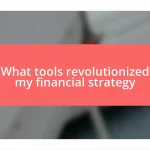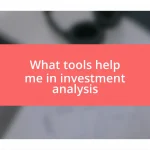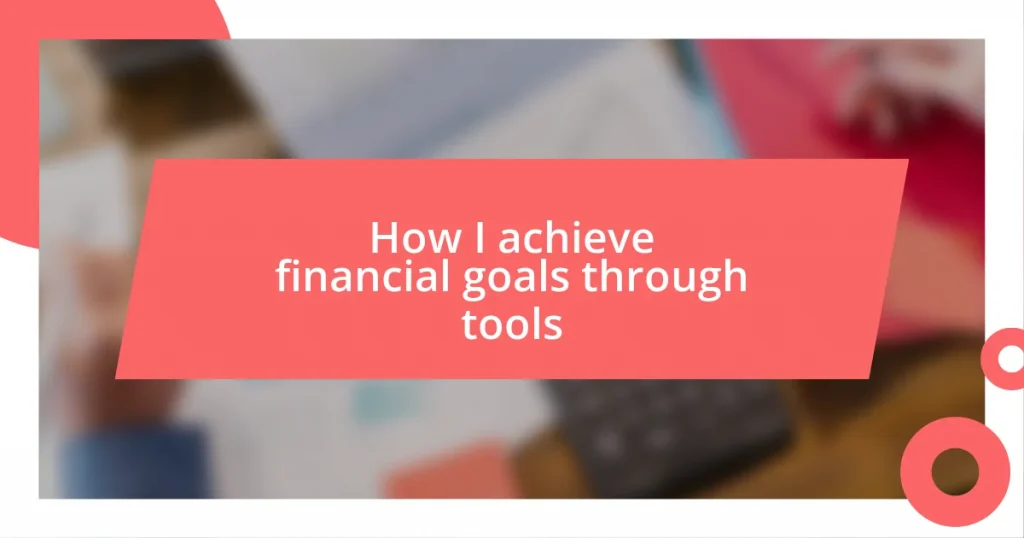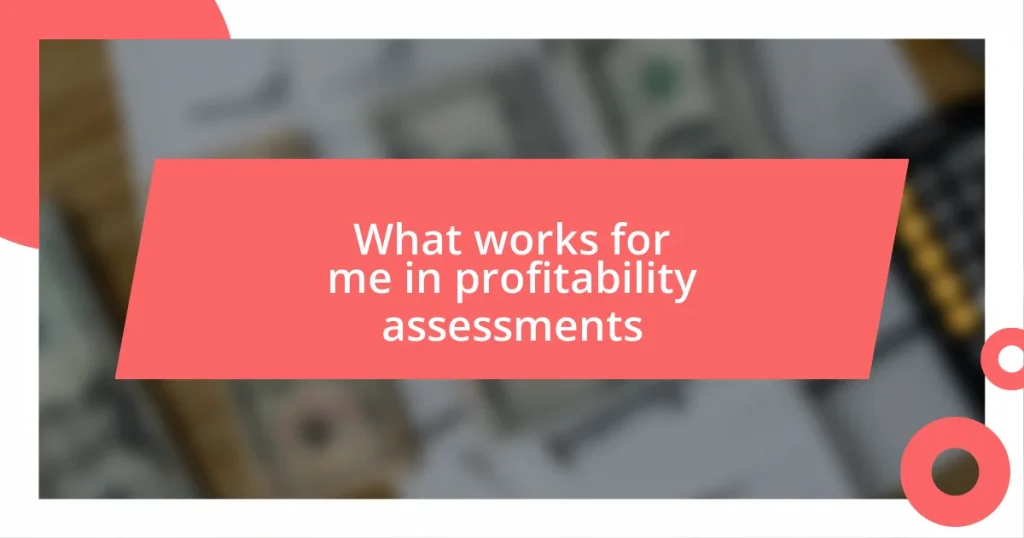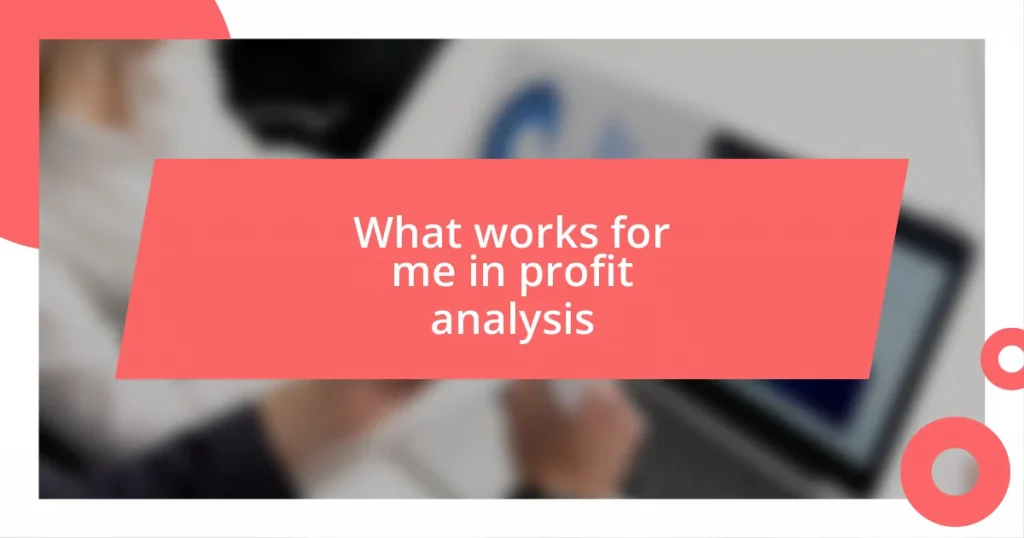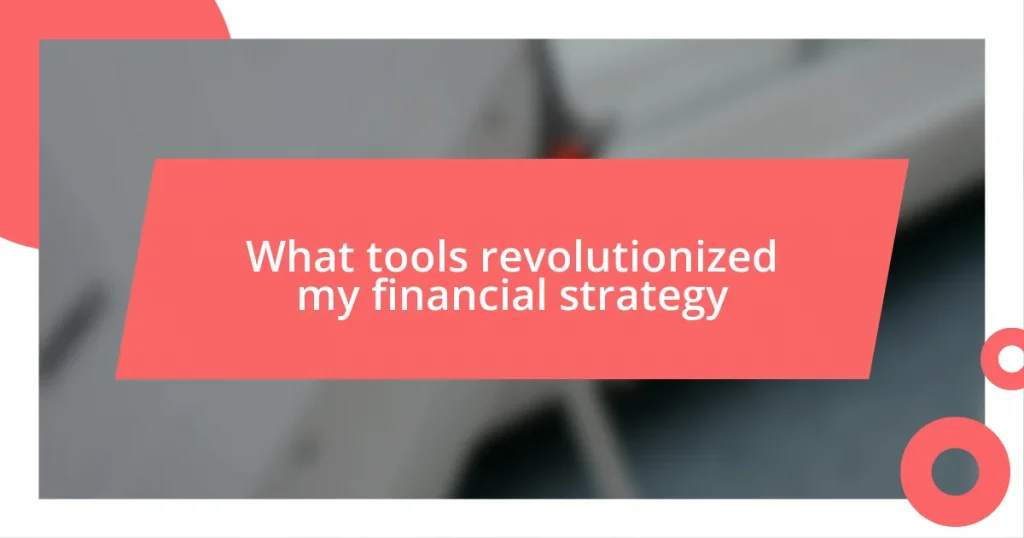Key takeaways:
- Setting specific and measurable financial goals enhances focus and makes achieving them feel attainable.
- Utilizing the right budgeting and investing tools helps streamline financial management and keeps motivation high.
- Regularly reviewing and adjusting goals ensures they align with current priorities and promotes a flexible approach to financial planning.
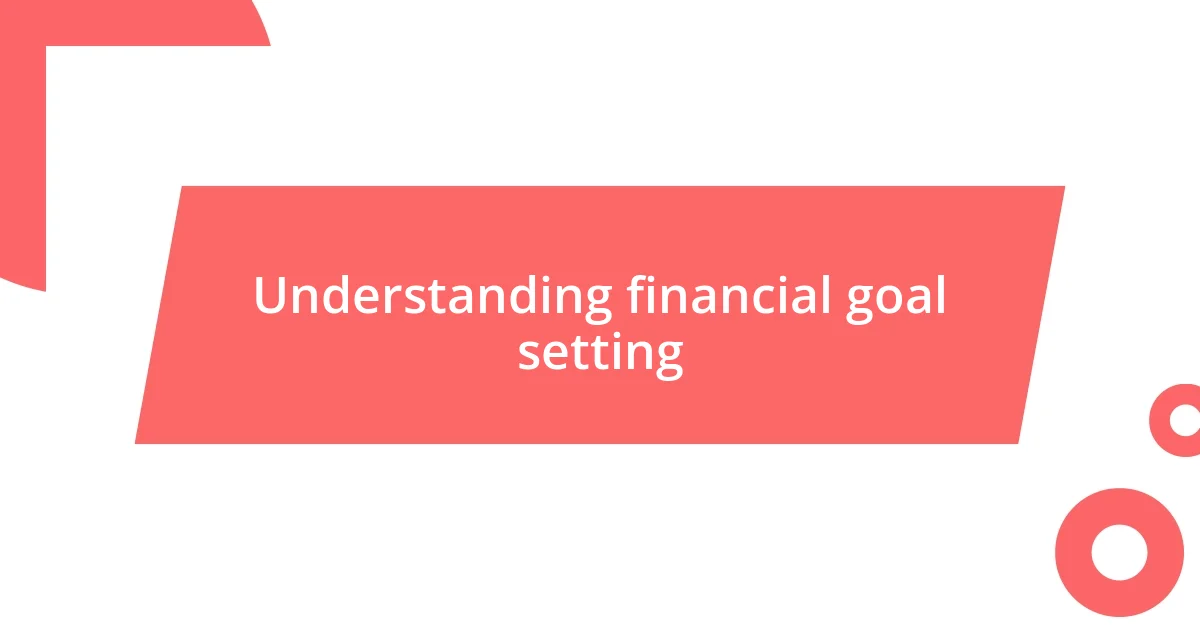
Understanding financial goal setting
When I first started my financial journey, I remember feeling overwhelmed by the sheer number of goals I wanted to achieve. It was tempting to set lofty aspirations without considering how practical they were. Have you ever experienced that? Defining clear, realistic goals not only gives direction but also creates a sense of purpose.
One of the most eye-opening moments for me was realizing that my financial goals needed to be specific and measurable. I used to say, “I want to save more,” but that vague target often left me frustrated. What if I had set a goal like “I want to save $5,000 by next year”? It’s a small shift, but it made my ambitions much more attainable and gave me something concrete to aim for.
As I navigated my financial goals, I learned the importance of prioritizing them. Not every goal holds the same weight at every stage of life. For instance, when I was paying off student loans, saving for retirement seemed far away. But focusing on what was crucial at that moment kept me grounded. Have you thought about what truly matters to you right now? Understanding your priorities can guide you in setting relevant and achievable financial goals.
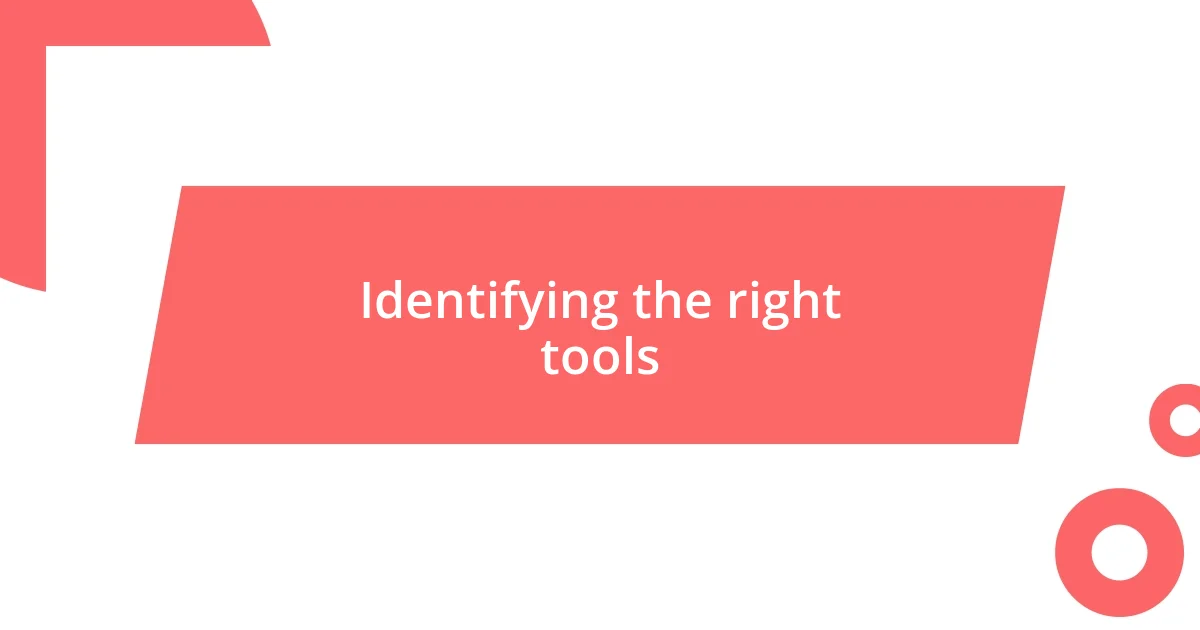
Identifying the right tools
Identifying the right tools can make a significant difference in whether you reach your financial goals. I recall the excitement I felt when I first discovered budgeting apps; they transformed my approach to handling finances. While some may struggle to stick to a budget using pen and paper, these digital tools made it fun and engaging for me, allowing me to track my spending in real-time and adjust as necessary.
When selecting tools, it’s essential to consider what fits your lifestyle and preferences. Here’s a quick list of aspects to evaluate:
- Usability: Does it have a user-friendly interface?
- Integration: Can it sync with your bank accounts or other financial tools?
- Customization: Does it allow you to tailor features to your specific needs?
- Community & Support: Is there a supportive user community or customer service available?
- Cost: Is it free, or does it have a subscription fee?
Finding the right fit doesn’t happen overnight. I went through several tools before landing on one that truly met my needs and motivated me. Personalizing my financial tools enabled me to cultivate effective habits that stick.
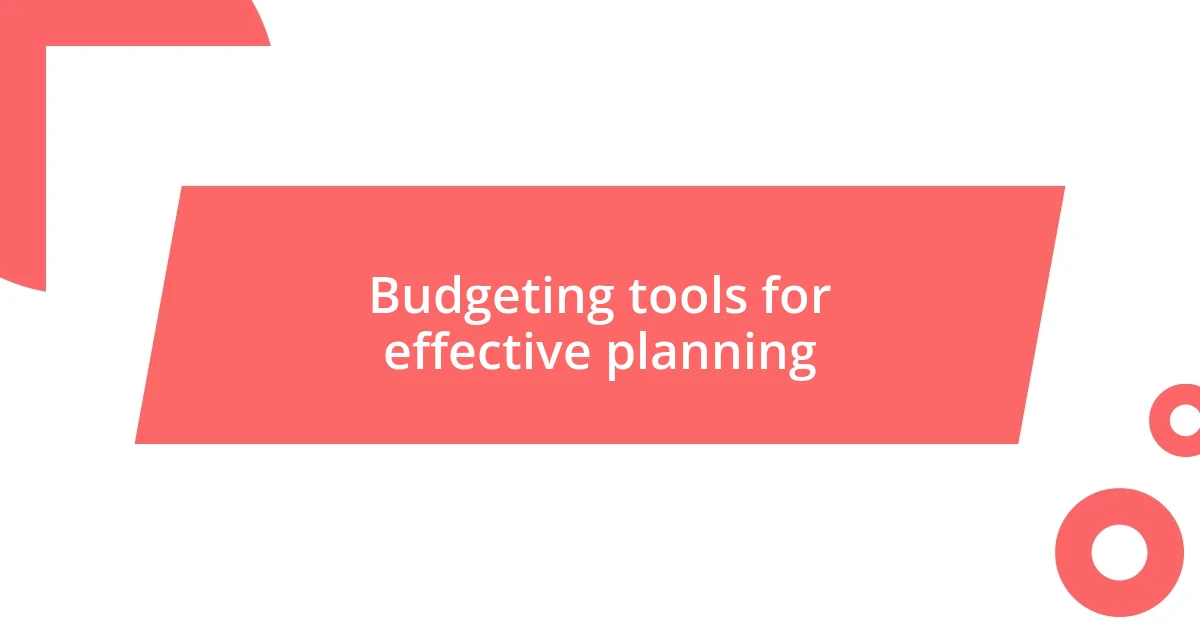
Budgeting tools for effective planning
When I began using budgeting tools, I was pleasantly surprised by the clarity they provided. Initially, I felt a bit apprehensive about sharing my financial data with an app. However, once I saw how effectively it organized my expenses and highlighted my spending patterns, my fear melted away. It was like shining a light on my finances, revealing areas where I could cut back. Have you ever had a moment of revelation in your financial journey that changed your perspective?
One budgeting tool that stands out for me is Mint. It aggregates all my financial accounts in one place, giving me a comprehensive view of my financial health. While using Mint, I appreciated how it allowed me to set budgets for different categories. It even sent me alerts when I was nearing my budget limits, keeping me accountable. Conversely, I didn’t find that level of engagement with other apps. They felt more like spreadsheets, rather than interactive tools guiding me along. Have you found a tool that motivates you to stay on track, or does budgeting feel like a chore for you?
| Budgeting Tool | Key Features |
|---|---|
| Mint | Real-time spending tracking and alerts for budget limits. |
| YNAB (You Need A Budget) | Focuses on proactive budgeting; every dollar has a job. |
| EveryDollar | User-friendly interface, zero-based budgeting approach. |
| PocketGuard | Shows how much is left to spend after bills and goals. |
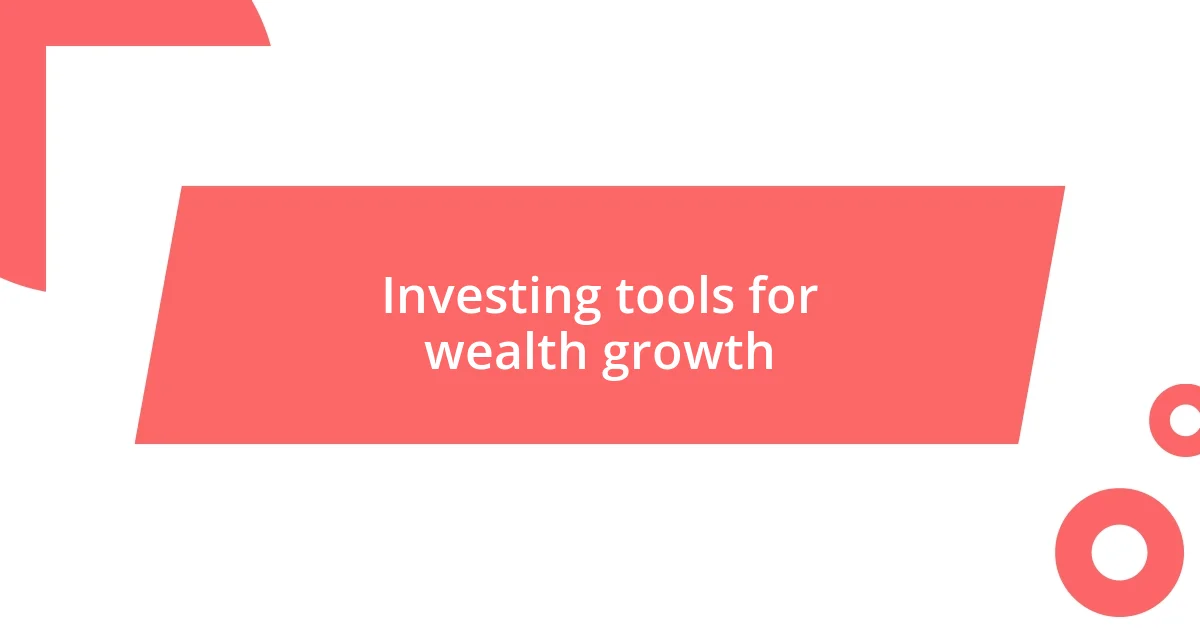
Investing tools for wealth growth
Investing tools are essential for building wealth, and I’ve found that they not only simplify the process but also keep me motivated. One of my go-to platforms is Robinhood. I remember the thrill of making my first investment; it felt empowering to have access to the stock market at my fingertips. That real-time feedback on my investments kept me engaged and eager to learn more. Have you ever felt that rush of making a smart financial decision?
Another tool that has significantly shaped my investing journey is Acorns. This app allows me to round up my everyday purchases and invest the spare change. It’s amazing to see how those little increments add up over time. I vividly recall a moment when I checked my account and realized that my “spare change” had grown into a substantial amount. It’s a prime example of how consistent, small contributions can lead to significant wealth growth. Can you imagine what you could achieve by turning your everyday spending into an investment opportunity?
Finally, I can’t undervalue the importance of educational platforms like Investopedia and Coursera. They offer courses on various investment strategies, which have broadened my understanding of different asset classes. Learning about diversification and market trends has made my investment decisions much more deliberate. I often reflect on how much more confident I feel in my financial choices since I began prioritizing education. What role do you think knowledge plays in your financial success?
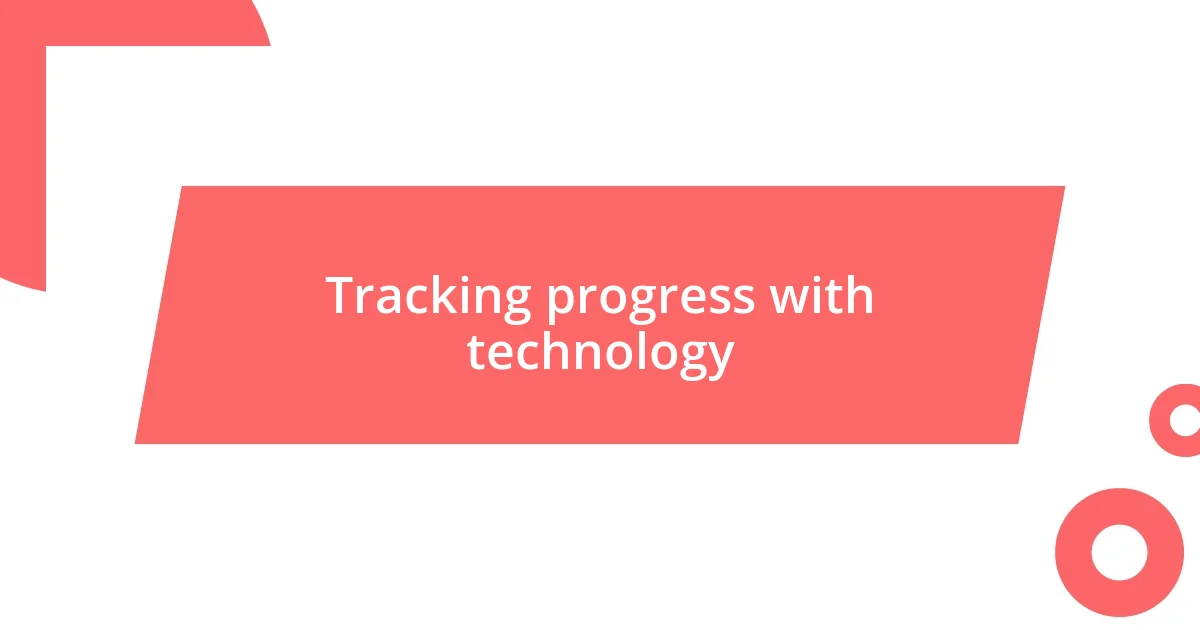
Tracking progress with technology
Tracking progress with technology has been a game changer for me. Using apps like Personal Capital, I can visualize my net worth growth over time, which is incredibly motivating. There’s nothing quite like that rush of seeing my hard work reflected in graphs, illustrating how my savings and investments are compounding. Have you ever stopped to analyze your financial journey and felt that sense of pride?
I remember vividly the first time I set financial milestones using an app. It was both exciting and daunting. With each goal, I received reminders and nudges that kept me on track, making me feel like I had a personal coach cheering me on. These tools don’t just track numbers; they create a narrative around my financial health, bridging the gap between planning and real-world results. What stories does your financial data tell you?
Automation has also transformed the way I track my progress. I set up automatic contributions to my savings and investment accounts, allowing technology to take the wheel while I focus on other priorities. The relief I felt knowing I was systematically building my wealth, even when life got busy, was huge. Every month, as I glanced at my accounts and saw upward trends, I was reminded that consistent effort pays off. What routines have you established to make your financial tracking easier?
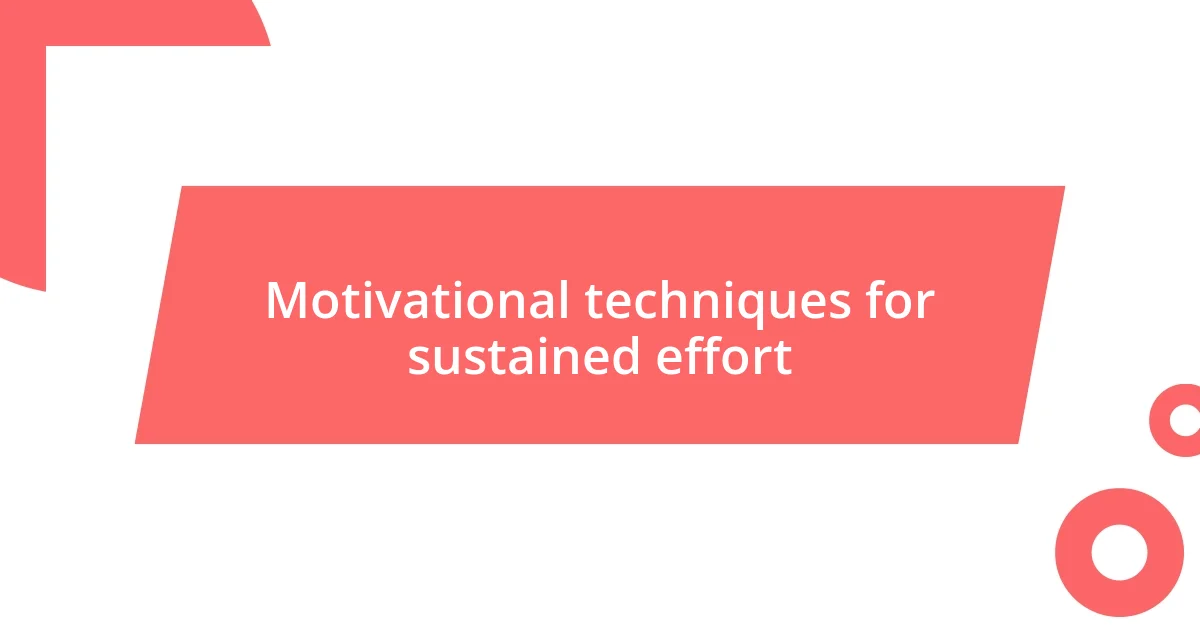
Motivational techniques for sustained effort
Staying motivated over time can often be challenging, so I’ve developed a few techniques that keep me on track. One of my favorites is setting mini-goals that lead up to a larger financial objective. I once aimed to save $1,000, but breaking that down into monthly targets made it feel more achievable. Each time I hit a milestone, I treated myself to something small, which fueled my momentum further. Have you tried rewarding yourself for financial achievements, no matter how small?
Visualization has also played a crucial role in my journey. I created a vision board featuring my financial targets and dreams. This allows me to see exactly what I’m working towards daily. There’s something powerful about putting your goals front and center; it continually reminds me of the value of my sustained effort. I often ask myself, “How can I align my daily choices with these aspirations?” and it brings clarity to my decision-making.
Lastly, I’ve found that sharing my goals with a supportive community keeps the motivation flowing. When I joined an online financial forum, I was amazed by the encouragement and accountability that came from others on similar journeys. I often post updates on my progress, and the feedback I receive is invigorating. It makes me feel part of something bigger and reminds me that I’m not alone in my efforts. Have you considered finding a community that shares your financial aspirations?
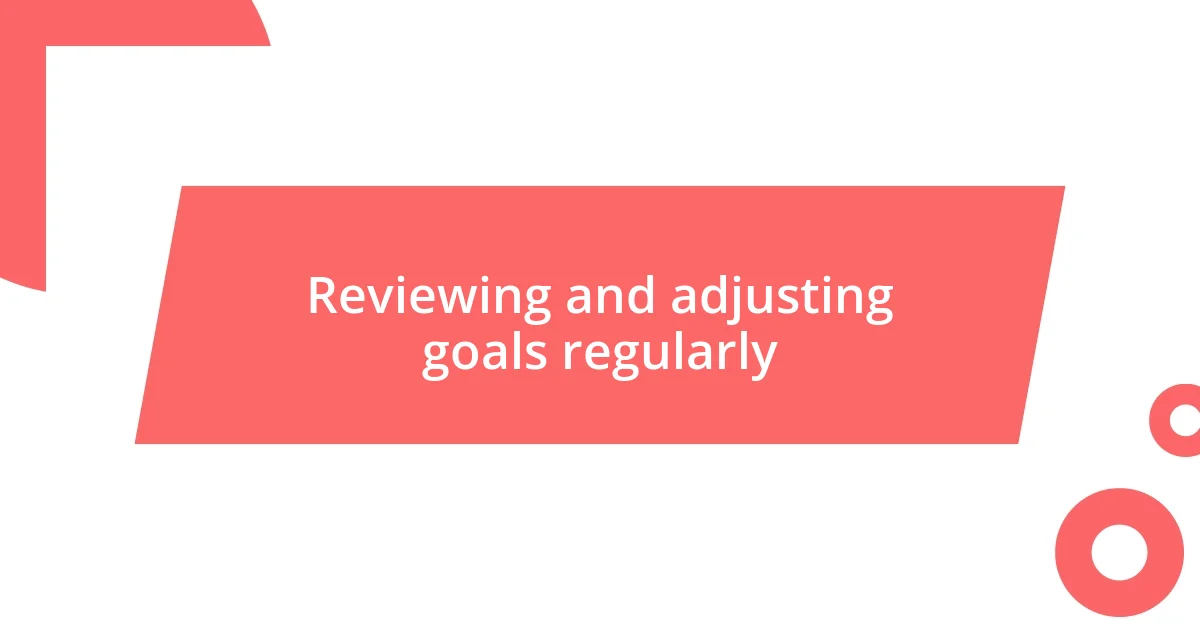
Reviewing and adjusting goals regularly
Regularly reviewing and adjusting my goals is crucial to my financial success. I make it a habit to revisit my milestones every few months. During these check-ins, I reflect on what I’ve accomplished and what hasn’t gone as planned. Have you ever felt that moment of clarity when you realize a goal no longer serves you? I certainly have, and it’s empowering to modify my path instead of rigidly sticking to something that doesn’t fit.
One memorable instance was when I assessed my savings goal for a vacation. Initially, I aimed for a specific dollar amount, but after analyzing my monthly budget, I realized it needed an adjustment. I found that my priorities had shifted, and instead of saving for a lavish trip, I wanted to focus on experiences closer to home. Realigning that goal sparked a wave of excitement and made my financial journey feel more relevant. How often do you reassess your goals to ensure they align with your current values?
Incorporating feedback from my daily life into my reviews has also been enlightening. For example, when I noticed that my spending had increased in one area, I adjusted my budget and reset my goals to reflect a more balanced approach. This flexibility has taught me to be patient with myself. Financial planning isn’t a straight path; it’s a dynamic process. Have you allowed yourself to pivot when needed, or do you find yourself holding on to outdated objectives?


